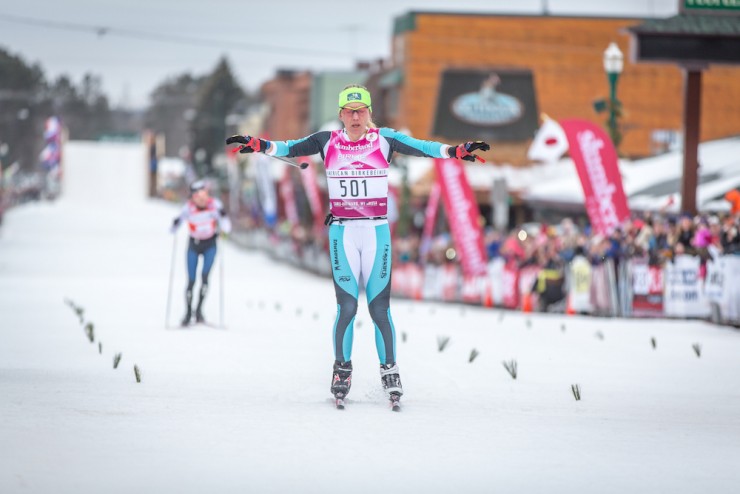
Caitlin Gregg said she had a hard time falling asleep Friday night, the eve of the 43rd annual American Birkebeiner. Understandable: she was going for a record-breaking fourth win in the 52-kilometer Birkie freestyle race, but moreover, she was going to have to do it in potential rain, slush or even ice, depending on how temperatures and precipitation shook out.
Race organizers didn’t groom the Birkie trail from Cable to Hayward, Wis., until Friday night.
“I was so impressed with the grooming. They did an amazing job,” she said in an interview with USSA’s Tom Kelly the next day, shortly after winning her fourth Birkie title to become the winningest skier in American Birkebeiner history. “It was the perfect mix of hard-packed with just a little bit of just soft snow on top, so that gave you a little purchase where you needed it. It would maybe change a little bit and become firmer in some areas or a little softer in others, but considering what they were delivered it was phenomenal.”
The 2016 Birkie on a gray, windy morning with temperatures in the upper 30’s was a tale of two races. It always is, with the elite women starting 20 minutes before the elite men, but on Saturday, Gregg and France’s Aurélie Dabudyk — the Worldloppet Cup leader — dropped the field around 42 k and Gregg held off Dabudyk by five seconds across the line. Just behind them, the men’s race remained tight over the slushy Lake Hayward and into the final stretches of Main Street, with David Norris of Alaska Pacific University winning by 1 second and fewer than 7 seconds separating the top five.
It was the first time two Americans had topped the podium in the elite men’s and women’s skate races since Holly Brooks and Tad Elliott won the Birkie in 2012.
“I did the Birkie this year for the first time because it fit my calendar really well and it is one of those American races you have to do!” Norris, a Fairbanks native, explained in a post-race email. “I knew their were a lot of experienced Euros and top Americans in the field today so I knew winning would be tough, but that was still the goal at the starting line.”
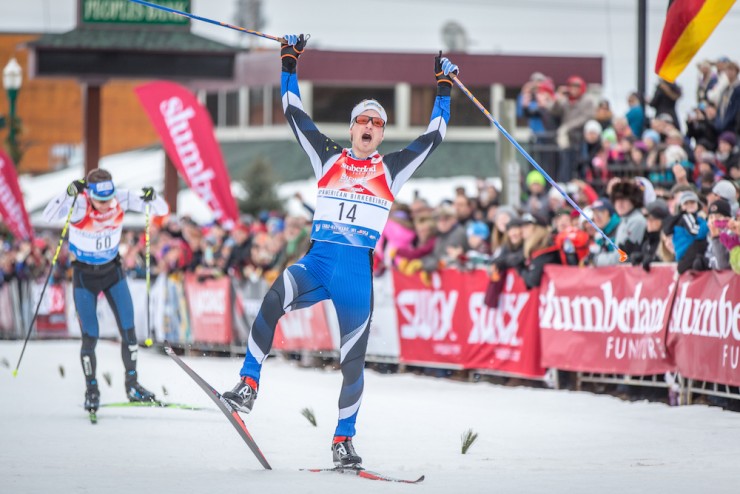
Of the top seven men, Norris was the only American. He outlasted France’s Ivan Perrillat Boiteux, of team Houte-Savoie, by a second at the line, winning in 2:05:35.4, and another Frenchman Benoit Chauvet (GEL intérim Rossignol) by 1.3 seconds.
“Winning the Birkie is like no other win,” Norris wrote. “The spectators are so supportive and the other Americans in the race were so happy for me even though their own races didn’t go as planned. Maybe the happiest moment of the day was seeing how happy my result made my friends and supporters.”
“I was very excited to win again,” Gregg wrote in an email Saturday night. “Every Birkie Victory has been a huge part of the financial equation for Brian and I in our racing careers.”
(Her husband and Team Gregg teammate, Brian Gregg, was the fourth American man and 13th overall, 1:01.9 minutes behind Norris. For the win, Caitlin received $7,500 dollars for winning plus $2,500 for being the top American, as did Norris, for $10,000 apiece.)
“I am so grateful to the thousands of friends and family who were cheering me on, the endless work of the organizers and volunteers, the fantastic skis by Caldwell Sport and their wax techs and the incredible support of our Team Gregg’s sponsors,” Gregg wrote. “I said it before but this race seems to be the most important of my entire career year after year (Including the Olympics and the World Championships) because I can share the experience with so many important people in my life. Skiing with 10,000 of your friends on the same trail on the same day is pretty tough to beat!”
‘I had a lot more to give’
According to Gregg, the pace of the women’s race started “very slow” by her standards, and “the foreign ladies did a lot of work out there today with 5 or 6 of us taking turns in the lead,” she wrote.
Gregg shared the workload with the likes of Dabudyk and her Houte-Savoie teammate, Italy’s Elisa Brocard and another Italian, Antonella Confortola (Forestale), who finished second to Brooks in last year’s Birkie. New to the Birkie, Klara Moravcova of the Czech Republic and Switzerland’s Rahel Imoberdorf came into the race ranked third and fourth in the overall Worldloppet standings, behind Dabudyk and Brocard.
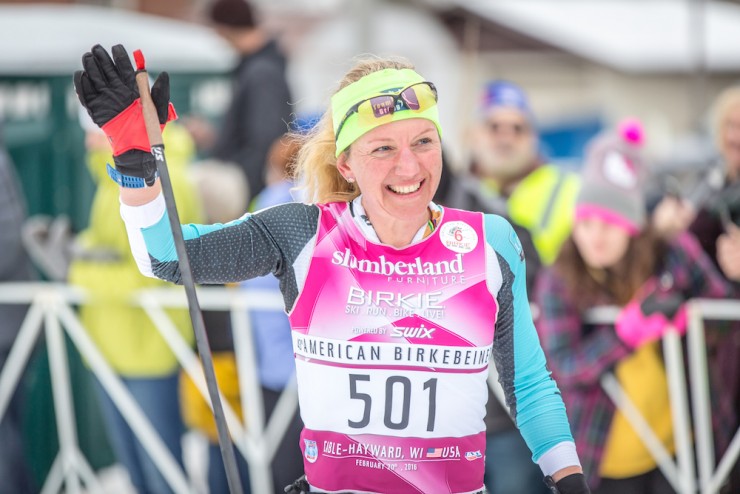
While word spread among spectators that Gregg may have broken a pole early in the race, Gregg dispelled it.
“The broken pole was actually a rumor,” she wrote. “I never broke a pole out there (thankfully). All of my equipment was perfect…”
About 38 k into the skate race, at a checkpoint called Mosquito Brook, Gregg decided it was time to turn it up a notch.
“I looked at my heart rate monitor periodically throughout the race and saw that I was sitting around 150-160 bpm which is level 2 for me. I have been doing a lot of harder training lately and knew I had a lot more to give,” she explained. “After spending the first 40K trying to ski as easy as possible (besides a few attacks) I decided to put the hammer down just after Mosquito Brook. There wasn’t a definitive plan at the start of the race because every race is different in terms of conditions and competitors but I could tell the other ladies were tiring on the uphills so I went for it on the longest one I knew.”
When she looked back around 42 k, she could see Dabudyk was the only one who had stayed with her.
“She pulled up behind me but I could tell she was spent,” Gregg wrote. “I hammered again and she was able to hang with me but wasn’t looking very comfortable.”
Gregg led most of the way from Mosquito Brook to the finish — about 14 kilometers — explaining that she tried to pull over at times to led Dabudyk take some of the workload up front. But her pace wasn’t cutting it for Gregg, who recalled that it was too slow and she was concerned the chase pack would catch back up to them.
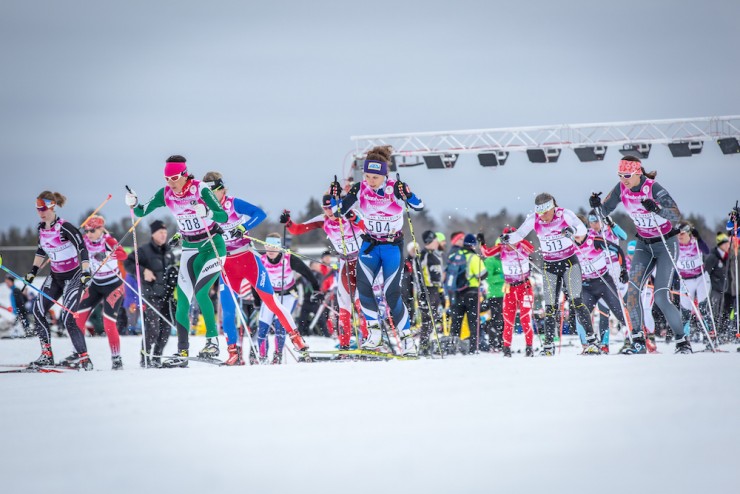
In the final kilometers of the race, across Lake Hayward, Gregg planned her finish.
“All I was focusing on was not tripping up and falling,” she wrote. “There was a headwind so I couldn’t pull away there but I could tell I was feeling a lot fresher than Aurelie. I wanted to be first over the bridge to have a clear shot into the finish lanes and it worked.”
Still leading Dabudyk into the final straightaway on the snow-covered Main Street, Gregg stayed ahead. Dabudyk moved to the left about halfway down the stretch to size up a move, but she didn’t have it. Gregg won in 2:22:44.5 by 5.1 seconds over Dabudyk.
“I felt great in the final 400 meters and was able to get the gap I needed,” Gregg wrote.
“My finish was very, very hard because Caitlin was very high speed…” Dabudyk said through a translator at the press conference. “Trying to pass at the finish, Caitlin was too fast.”
With the silver, Dabudyk retained her lead in the FIS Worldloppet Cup.
“For sure, the Worldloppet Cup is my big goal of the season,” Dabudyk said.
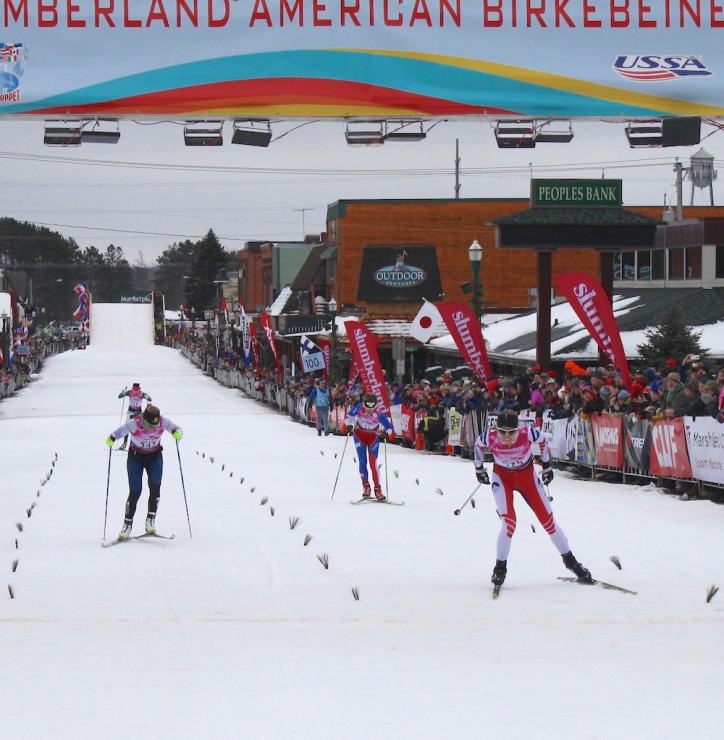
Nearly two minutes later, Erika Flowers of the Stratton Mountain School (SMS) T2 Team held off Brocard and Moravcova by 1.4 and 3.1 seconds, respectively, for third place, 1:51.1 behind Gregg.
“I felt really good coming into the last 5km of the race and skiing onto the lake with Elisa, Clara and Antonella,” Flowers wrote in an email. “I knew I needed to push over the bridge and I felt confident in my finishing speed. I came over the bridge in 5th and knew I could catch at least one person but I was thrilled to ski into 3rd!”
In her first Birkie, Flowers, of Bozeman, Mont., explained she “had no idea what to expect …especially since I had never raced against many of the European skiers in the elite field,” she wrote. “However I have been feeling stronger every week this winter and I love skate distance racing so I figured that on a good day, I had a shot at the podium.”
The last time she did a marathon was seven years ago at the 50 k freestyle Rangeley Lakes Loppet in Maine. She explained that was more of a tour than a race, and she couldn’t remember how she did.
“Besides that, the longest race I have ever done is the 30km at Spring Series each year. I was sick in Sun Valley and didn’t race last year but I finished 9th in the classic 30km in Anchorage two years ago,” Flowers explained.
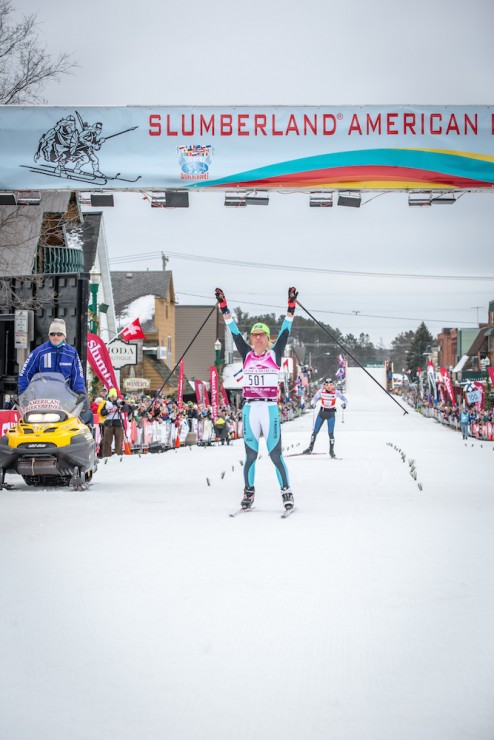
She’ll wrap up her season with OPA Cup races in Europe in a few weeks.
“I really wanted to be racing the Canadian World Cups this year but an unfortunately timed elbow break in the fall challenged both my race shape and confidence in the early season,” she wrote. “I would have loved to be getting these kind of results a few months ago but I am proud of the work I have done since then and excited to keep on the up and up! I am also psyched to watch all of the Americans racing in Canada! I think we could see some awesome results from both World Cup veterans and newbies and can’t wait to cheer!!!”
A U.S. Ski Team member, Gregg earned a discretionary spot at the season-ending World Cups at the Ski Tour Canada from March 1-12.
“Both Brian and I are headed to Canada in a week to compete in the World Cups and we are very excited!” she wrote. “I will spend everyday this week working with the local Loppet Nordic Racing juniors helping them prepare for the Junior Nationals back here at Telemark. After Canada, Brian and I will go to Vermont and spend some time in the Mad River Valley (where I learned to XC Ski) visiting with the local community, skiing with local schools and Bill Koch kids and training with GMVS. Then it’s off to Craftsbury for Super Tour Finals.”
About 10 seconds behind Flowers, Confortola placed sixth (2:00.7 minutes after Gregg). Imoberdorf was seventh (+2:55.8), Switzerland’s Nicole Donzallaz finished eighth (+2:56.8), Minneapolis native Rosie Frankowski of APU placed ninth (+3:09.5), and CXC’s Alice Flanders took 10th (+5:55.1).
Notably, FasterSkier’s Kaitlyn Patterson, of Traverse City, Mich., placed 18th in the elite women’s field.
‘Nobody wanted to lead’
For Norris, it was as simple as resolving to catch a rogue racer with about 7 k to go. Chauvet, a regular podium contender at the Birkie, had surged off the front, leaving about 20 men in the lead pack chasing behind him.
“I decided to go for him,” Norris wrote. “When I caught him he shut down the effort immediately and I had to decide whether or not to take the reins. We ended up slowing up the pace coming into the lake and it became a pack of seven guys. I think six Frenchmen and myself.”
There, racers met soft and slushy conditions for the first time on an otherwise fast course.
“We had to double pole through a small ankle deep section of water, but overall the groomers made the course fast and firm for us!” Norris noted. “We slowed up coming into the lake and throughout the majority of the lake crossing. There was the typical headwind on the lake that I had heard about. It seemed nobody wanted to lead on the lake.”
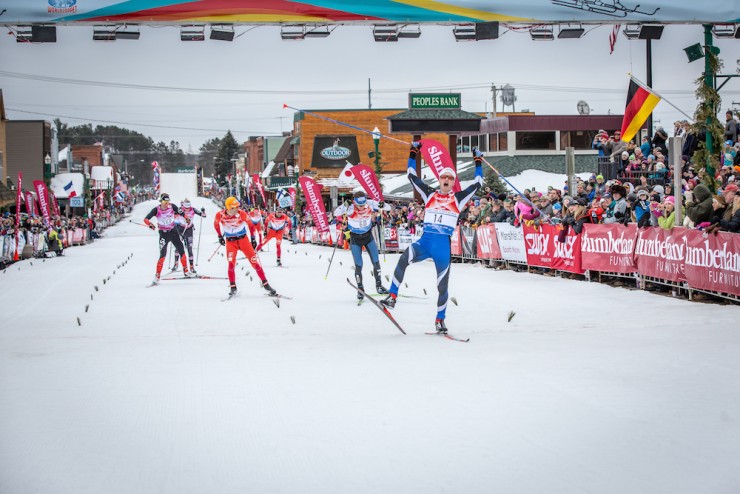
But he wanted to be in the lead coming off of it. With experience from the elite sprints two days earlier, Norris knew the 400-meter stretch up and over the International Ski Bridge and down into Main Street to the finish was a short one — not much ground was going to be made up there.
“I pushed it coming off the lake and tried to come off the bridge as fast as possible,” he wrote. “Main Street was the loudest thing I have ever heard and I honestly had no idea If skiers where coming up on me cause I couldn’t hear a thing. I got the dream legs sensation where the pain goes numb and I was just going max effort until I hit the line. I don’t think I celebrated until I was on the line and knew I couldn’t lose it!”
Not only did Norris beat Perrillat Boiteux in second and Chauvet in third, he also outlasted a third Frenchman Adrien Mougel (GEL intérim Rossignol) in fourth (+4.7), Switzerland’s Candide Pralong (GEL intérim Rossignol) in fifth (+6.6), France’s Mathias Wibault in sixth (+8.7), and Italy’s 2014 Birkie champion Sergio Bonaldi (Team Salomon Italia) in seventh (+12.9).
The second American, Kris Freeman (Team Freebird) placed eighth (+33.7). Ivan Babikov of the Canadian World Cup Team was ninth (+349), and one of the initial challengers, Tad Elliott (Ski & Snowboard Club Vail) placed 10th (+38.9).
“Tad made the first real move with 15 or 10km to go and that was the first real push,” Norris recalled. “I think that made people second-guess themselves for the first time. During this effort I realized I was feeling strong and had skid the early portion of the course well and had saved energy for the finish.”
“Chauvet is really experienced and a really nice guy,” Norris added of the Frenchman who changed the race for good. “He did some early work to make our pack just a leading group of maybe 20 guys.”
Asked if the move was too early, Chauvet responded at the press conference, “I’m not sure it was too early. I think I was in very good shape in climbs, but the last 7 kilometers it’s difficult when you are alone when there is a group behind you because people try to catch you.
“I thought I was able to win today and I’m a bit disappointed, but I’m rather happy to make the podium,” he added. “And I will try to win again last year.”
With his second-place finish, Perrillat Boiteux moved into first in the Worldloppet Cup.
“I’m very happy to get the red bib,” he said at the press conference through a translator (Chauvet). “The goal this season is to win the FIS Worldloppet Cup, but the race in two weeks [the Bieg Piastow] is classic and classic is not my main technique so I will try to do the best there and try to keep the red bib to the last race.”
Asked if Norris would continue on the Worldloppet circuit after earning 100 points as the winner (putting him 10th in the overall standings) he replied, “No.” Next year? Probably not, he said with a laugh.
Three races remain in the Worldloppet Cup series, including the Bieg Piastow in Poland, Engadin Skimarathon in Switzerland, and UgraSki marathon in Russia.
Norris planned to end his season with the Tour of Anchorage and Spring Series in Vermont.
“I had a slower start to the season with frustrating results at Nationals, which made qualifying for [the Ski Tour] Canada tough,” he wrote. “At the moment my plans are to return to Anchorage and attend the Tour of Anchorage ski race. The final set of races for me in four weeks will be spring series. I feel like my fitness is improving the longer the season goes so I am hoping to stay healthy and try to finish out the season with a strong result in the 15km and 50km in Vermont.”
Classic Birkie
In the 55 k classic Birkie, Welly Ramsey (Maine Winter Sports Center) won the men’s race in 2:48:59.9, and former Michigan Tech skier, 23-year-old Deedra Irwin of Wisconsin claimed the women’s title in 3:11:58.8. Both won the elite sprints on Thursday and went on to win the classic marathon by more than 12 minutes.
Ramsey, 25, skied to the Birkie classic title by 12:07.2 minutes over Nick Power of CXC. Third went to Canada’s Murray Carter (+12:09.2).
“I just wanted to be on the front and stay out of the fray, but then I turned around and no one else was there so I had a nice 50 k ski by myself,” Ramsey told FasterSkier afterwards. “This is my first Birkie. It feels pretty good. You can call it beginner’s luck.”
Meanwhile in the women’s race, Irwin won by 12:46.7 over Isabel Caldwell (U.S. Ski Team standout Sophie Caldwell’s younger sister) of Peru, Vt. Another 10 minutes back, Josie Nelson of Medicine Lake, Minn., placed third (+22:49.4).
Worldloppet rankings: women | men
— Gabby Naranja and Jeremy Blazar contributed reporting
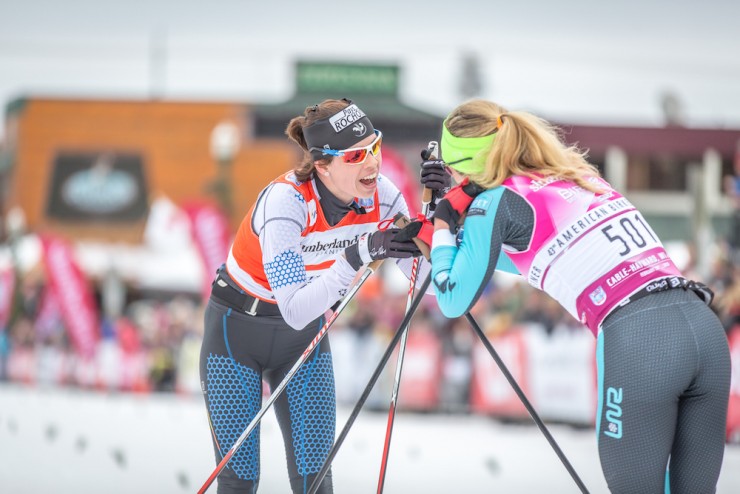
Alex Kochon
Alex Kochon (alexkochon@gmail.com) is a former FasterSkier editor and roving reporter who never really lost touch with the nordic scene. A freelance writer, editor, and outdoor-loving mom of two, she lives in northeastern New York and enjoys adventuring in the Adirondacks. She shares her passion for sports and recreation as the co-founder of "Ride On! Mountain Bike Trail Guide" and a sales and content contributor at Curated.com. When she's not skiing or chasing her kids around, Alex assists authors as a production and marketing coordinator for iPub Global Connection.



